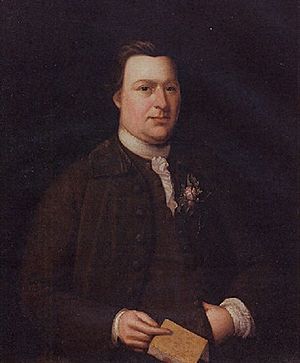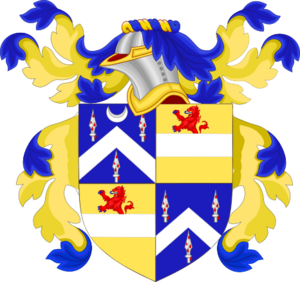Button Gwinnett facts for kids
Quick facts for kids
Button Gwinnett
|
|
|---|---|
 |
|
| 8th Governor of Georgia | |
| In office February 22, 1777 – May 8, 1777 |
|
| Preceded by | Archibald Bulloch |
| Succeeded by | John Adam Treutlen |
| Member of the Continental Congress from Georgia |
|
| In office 1776–1777 |
|
| Personal details | |
| Born | March 3, 1735 Down Hatherley, England, UK |
| Died | May 19, 1777 (aged 42) near Savannah, Georgia, British America (now U.S.) |
| Spouse | Ann Bourne |
| Signature | |
Button Gwinnett (born March 3, 1735 – died May 19, 1777) was one of America's Founding Fathers. He was born in England but became an important leader in the American colonies. He represented Georgia in the Continental Congress. He is famous for being one of the people who signed the United States Declaration of Independence.
Gwinnett also briefly served as the leader of Georgia in 1777. A county in Georgia, Gwinnett County, is named after him. He was named in honor of his mother’s cousin, Barbara Button. Button Gwinnett died after a fight with a rival, Lachlan McIntosh, following a failed military mission.
Early Life and Moving to America
Button Gwinnett was born in 1735 in a place called Down Hatherley in England. His father, Samuel Gwinnett, was from Wales. Button was the third of seven children. He was baptized in a church in Gloucester on April 10, 1735.
When he was young, Button Gwinnett worked for his uncle, who was a greengrocer. Later, he worked for an ironmonger, someone who sells metal goods. On April 19, 1757, he married Ann Bourne. They had three daughters. In 1762, Button and Ann left England and moved to America.
Gwinnett tried different businesses in America, but they were not very successful. In 1765, he moved to Savannah, Georgia, and opened a store. When that didn't work out, he bought an island called St. Catherines Island. He also bought many enslaved people to work on his land. Even though his farming efforts didn't do well, he became known in local politics. He was elected to the Provincial Assembly, which was a part of the local government.
Political Career
Button Gwinnett became a strong supporter of the colonies' rights in 1775. This happened when the area where he lived threatened to leave Georgia. This was because Georgia was slow to react to the big changes happening at the time. While in the Assembly, Gwinnett's main rival was Lachlan McIntosh. His good friend was Lyman Hall.
Gwinnett was chosen to represent Georgia at the Continental Congress. This was a meeting of leaders from the American colonies. He voted to approve the Declaration of Independence, which was adopted on July 2, 1776. He signed the famous document on August 2, 1776.
After signing the Declaration, Gwinnett wanted a high-ranking military job in the Continental Army. However, he lost this position to his rival, Lachlan McIntosh. This made Gwinnett very upset.
Gwinnett also served in Georgia's government. In 1777, he helped write the first state constitution for Georgia. He became the leader of the Georgia Assembly. He held this job until the death of Georgia's President (who was like a governor), Archibald Bulloch. Gwinnett then became the new leader of Georgia. In this role, he tried to weaken McIntosh's power.
Their disagreements grew very strong when the Assembly approved Gwinnett's plan for a military attack on British Florida in April 1777.
Death
As the acting leader of Georgia and commander of its military, Button Gwinnett was in charge of his rival, Lachlan McIntosh. Gwinnett had McIntosh's brother arrested. He also ordered McIntosh to lead the attack on British-controlled East Florida, which failed.
Gwinnett and McIntosh blamed each other for the defeat. McIntosh publicly called Gwinnett bad names. Gwinnett then challenged McIntosh to a duel, which was a formal fight with weapons. They fought on May 16, 1777. Both men were shot. Gwinnett died from his injuries on May 19, 1777. He is believed to be buried in Colonial Park Cemetery in Savannah. McIntosh recovered from his wounds and lived until 1806. He was not charged for Gwinnett's death.
Legacy
Button Gwinnett's signature is very rare and valuable to collectors. This is because he was not well-known before signing the Declaration of Independence and died soon after. There are only 51 known examples of his signature. Only ten of these are owned by private collectors.
Gwinnett County, Georgia, which is a large area near Atlanta, is named after him. He is also honored with a monument in Augusta, Georgia, along with the other two Georgia signers of the Declaration of Independence.
See also
 In Spanish: Button Gwinnett para niños
In Spanish: Button Gwinnett para niños
- Memorial to the 56 Signers of the Declaration of Independence
- List of U.S. state governors born outside the United States
 | William Lucy |
 | Charles Hayes |
 | Cleveland Robinson |


